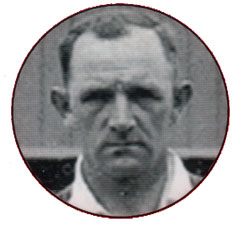 Willie Jeffrey, who entered North West of Ireland senior cricket in 1920, was a batsman with great hitting power, a fine eye, strong wrists and a fearless, aggressive manner. A match winner on many occasions, he rarely took time to play himself in, and usually went for the bowling in a manner that delighted spectators.
Willie Jeffrey, who entered North West of Ireland senior cricket in 1920, was a batsman with great hitting power, a fine eye, strong wrists and a fearless, aggressive manner. A match winner on many occasions, he rarely took time to play himself in, and usually went for the bowling in a manner that delighted spectators.
Willie learned his cricket with Church Lads Brigade, whom he assisted to win the North West Junior Cup in 1919. He entered senior cricket the following year when Brigade gained senior status. In 1924 he joined City of Derry and recorded the season's only century, scoring 117 not out against the Royal Sussex Regiment on July 12. This century, plus a tremendous 91 not out in 35 minutes earlier in the season, helped give him an aggregate of over 500 runs for the season.
Two years later with Brigade again, he scored 139 not out in ninety minutes against the Sherwood Foresters to equal the highest individual score, established by a Lieutenant Martyn of the West Kent Regiment in 1893. He again exceeded 500 runs in 1929, his highest score for the season being a 94 in sixty five minutes against Fawney at Beechgrove, Londonderry, on 18 May.
His best season, however, was in 1930 when he aggregated 729 runs. During this season he became the first player to score a century (143 not out) in the annual County Derry v County Tyrone match on Saturday June 3. During the following week he made history in the North West of Ireland by becoming the first North West player to score a century in successive fixtures when, against St.Johnston on June 5, he scored another century. In this match he scored his century in forty minutes.
In 1931 he hit 111 on August 8 against Waterside and in 1935 he scored his last century in league cricket while playing for City of Derry again. This time he scored 132 off his old club, Brigade, at Lower Duncreggan, Londonderry, delighting the spectators present by punishing almost every ball in a brilliant display.
Jeffrey, in 1936, joined Killaloo, who during that year were to become known as Eglinton, while in 1938, when Waterside regained entry into the senior division, he turned out for them, and with Waterside in 1940 he had the distinction of accomplishing the season's only hat-trick of wickets.
Following retirement from playing, Willie Jeffrey continued his involvement in North West of Ireland by acting as an umpire for many years.
